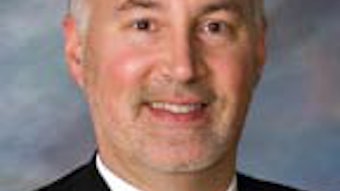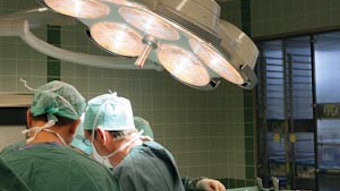“Head and Neck Surgery Is Supposed to Be Fun”
A Resident’s Perspective on the Head and Neck Surgery Rotation Mark Domanski, MD Chief Resident, Otolaryngology George Washington University At the close of an interesting case, my attending physician remarked, “Head and neck surgery is supposed to be fun.” The case had been enjoyable. However, my attending’s statement seemed at odds with the attitudes of some otolaryngology residents. In discussions among themselves, many residents will remark about the pleasure of coming off their head and neck service, or the dread of soon resuming it. This is unfortunate, particularly from an educational standpoint. Over the past three years of otolaryngology residency, I have been blessed to work with a diversity of great surgeons. During a facelift, my facial plastics attending remarked how the technique was similar to raising flaps for a parotidectomy. When my rhinology attending asked me about treatment of orbital hematomas, he wanted to hear me describe a lateral canthotomy. While watching a pediatric otolaryngologist drain a neck abscess, I observed how comfortable she was with neck anatomy. Despite these otolaryngologists’ divergent subspecialties, each of them had learned fundamental operative technique, decision-making, and complication management from head and neck surgery. A danger exists if a resident moves on to other subspecialties without fully mastering the principles of head and neck surgery: wound healing, patient selection, postoperative care, and most importantly, critical decision-making. These skills learned in head and neck training, are well-suited to the mastoid, airway, and sinus. For these reasons, academic programs must ensure that their residents look forward to the head and neck surgery rotation. Today’s otolaryngology residents may fail to attain many of the education benefits of head and neck surgery because of a negative attitude. They make excuses such as, “I will not be doing commandos when I graduate,” or “This is a case that I am going to refer to the university hospital.” Certainly, most residents’ future practices will not be primarily head and neck oncology. But I think this misses the point. It’s easier to learn soft tissue handling in a neck dissection than in a rhinoplasty. The approaches to orbital fractures are the same as used for blepharoplasty. No place is better to learn laryngeal anatomy than during a laryngectomy. As a resident, I have observed that many of my counterparts have a poor perception of head and neck surgery. Simply put, their head and neck rotation is “not fun.” Head and neck rotations can include long hours, imperfect outcomes, and difficult patients. However, neuro-otology cases are not quick, nasal polyps can recur, and even facial plastic patients can be unsatisfied. There must be something else to explain resident attitudes. I am lucky to be at a program where residents enjoy head and neck surgery. Our head and neck attendings encourage residents to take ownership of patient care. Head and neck can provide residents a level of autonomy that is difficult in subspecialties like facial plastics or pediatric otolaryngology. Our patients benefit from (intensivist controlled) closed ICUs, which manage vent settings, pressors, and electrolytes. Closed ICUs free otolaryngology residents to focus on the operating room, floor patients, and consults. Our institution uses implantable Dopplers for free-flap monitoring. This eliminates the need for Q2 hour flap checks by the junior resident. As a result, junior residents start off with a better attitude toward head and neck surgery. Because our program is small, there is no task too junior for the senior resident. If anything remains to be done, the junior and senior work as a team to get it done. Head and neck surgery provides educational opportunities that are difficult to find elsewhere in otolaryngology residency. For this reason, programs should be aware of their residents’ attitudes toward head and neck surgery. By keeping head and neck surgery fun, the way it’s supposed to be, residents and patients both benefit.

Chief Resident, Otolaryngology
George Washington University
At the close of an interesting case, my attending physician remarked, “Head and neck surgery is supposed to be fun.” The case had been enjoyable. However, my attending’s statement seemed at odds with the attitudes of some otolaryngology residents. In discussions among themselves, many residents will remark about the pleasure of coming off their head and neck service, or the dread of soon resuming it. This is unfortunate, particularly from an educational standpoint.
Over the past three years of otolaryngology residency, I have been blessed to work with a diversity of great surgeons. During a facelift, my facial plastics attending remarked how the technique was similar to raising flaps for a parotidectomy. When my rhinology attending asked me about treatment of orbital hematomas, he wanted to hear me describe a lateral canthotomy. While watching a pediatric otolaryngologist drain a neck abscess, I observed how comfortable she was with neck anatomy. Despite these otolaryngologists’ divergent subspecialties, each of them had learned fundamental operative technique, decision-making, and complication management from head and neck surgery.
A danger exists if a resident moves on to other subspecialties without fully mastering the principles of head and neck surgery: wound healing, patient selection,
postoperative care, and most importantly, critical decision-making. These skills learned in head and neck training, are well-suited to the mastoid, airway, and sinus. For these reasons, academic programs must ensure that their residents look forward to the head and neck surgery rotation.
Today’s otolaryngology residents may fail to attain many of the education benefits of head and neck surgery because of a negative attitude. They make excuses such as, “I will not be doing commandos when I graduate,” or “This is a case that I am going to refer to the university hospital.” Certainly, most residents’ future practices will not be primarily head and neck oncology. But I think this misses the point. It’s easier to learn soft tissue handling in a neck dissection than in a rhinoplasty. The approaches to orbital fractures are the same as used for blepharoplasty. No place is better to learn laryngeal anatomy than during a laryngectomy.
As a resident, I have observed that many of my counterparts have a poor perception of head and neck surgery. Simply put, their head and neck rotation is “not fun.” Head and neck rotations can include long hours, imperfect outcomes, and difficult patients. However, neuro-otology cases are not quick, nasal polyps can recur, and even facial plastic patients can be unsatisfied. There must be something else to explain resident attitudes.
I am lucky to be at a program where residents enjoy head and neck surgery. Our head and neck attendings encourage residents to take ownership of patient care. Head and neck can provide residents a level of autonomy that is difficult in subspecialties like facial plastics or pediatric otolaryngology. Our patients benefit from (intensivist controlled) closed ICUs, which manage vent settings, pressors, and electrolytes. Closed ICUs free otolaryngology residents to focus on the operating room, floor patients, and consults. Our institution uses implantable Dopplers for free-flap monitoring. This eliminates the need for Q2 hour flap checks by the junior resident. As a result, junior residents start off with a better attitude toward head and neck surgery. Because our program is small, there is no task too junior for the senior resident. If anything remains to be done, the junior and senior work as a team to get it done.
Head and neck surgery provides educational opportunities that are difficult to find elsewhere in otolaryngology residency. For this reason, programs should be aware of their residents’ attitudes toward head and neck surgery. By keeping head and neck surgery fun, the way it’s supposed to be, residents and patients both benefit.











